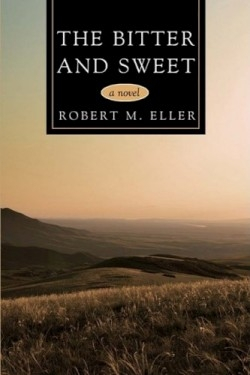The Bitter and Sweet
The Bitter and Sweet begins like a stereotypical romance novel. A young foolish heroine rides her horse into a storm and is rescued by a mysterious older man. She is immediately intrigued by him while he all but ignores her. The similarity to formulaic romance soon ends.
In fact to call this book a novel at all is a stretch. It doesn’t have much of a plot; its ending is predictable and it certainly isn’t a romance by most definitions; this couple isn’t destined for happily ever after. Instead the book is an allegory in which the metaphors are tangled. Robert M. Eller’s heroine Alice discovers that she is not the first person to be saved by the Christ-like hero Lone. He has replaced Alice’s own father as the hero among the locals. Besides being a disciple Alice is sometimes Aphrodite and at other times Eve.
The two begin a relationship in which sex scenes set in an untouched Paradise alternate with discussions of excerpts from Lone’s ten years’ worth of journals. As winter approaches Alice must decide whether to break it off with Lone or remain with him in his remote snowbound cabin. She wishes their closeness could go on. Lone is grateful to have her: “…it’s bitter that it will end but sweet because it might never have happened at all. The future can take away from us so there is bitter. But if you take the present into yourself deeply what has happened is safe forever. This is why the sweetness is stronger than the bitter if one lives correctly.”
Lone is part philosopher part sensualist. The parts don’t mesh however and the result is unconvincing. For example he has renounced the material world yet has financial investments that support him. He has very few items of furniture but has built a sauna behind his log cabin.
The writing is uneven veering between flowery descriptions of the overly abundant sexual encounters and sermonizing about man and his relationship with nature. The names of people and animals are unimaginative and heavy-handed: Arthur or A. Lone is an exile from civilization who lives pre-Alice alone; his horse is named Equus. His home is in the Covenant Mountains near Trinity Forest. Alice lives in Gotham City. The dialogue is equally stilted.
Eller himself left the corporate world more than a decade ago to work on this book so he has had plenty of time to develop his ideas. They are not without merit. He might better have served readers if he had also devoted some of that time to reading more fiction and developing an ear for good dialogue.
Disclosure: This article is not an endorsement, but a review. The publisher of this book provided free copies of the book and paid a small fee to have their book reviewed by a professional reviewer. Foreword Reviews and Clarion Reviews make no guarantee that the publisher will receive a positive review. Foreword Magazine, Inc. is disclosing this in accordance with the Federal Trade Commission’s 16 CFR, Part 255.

